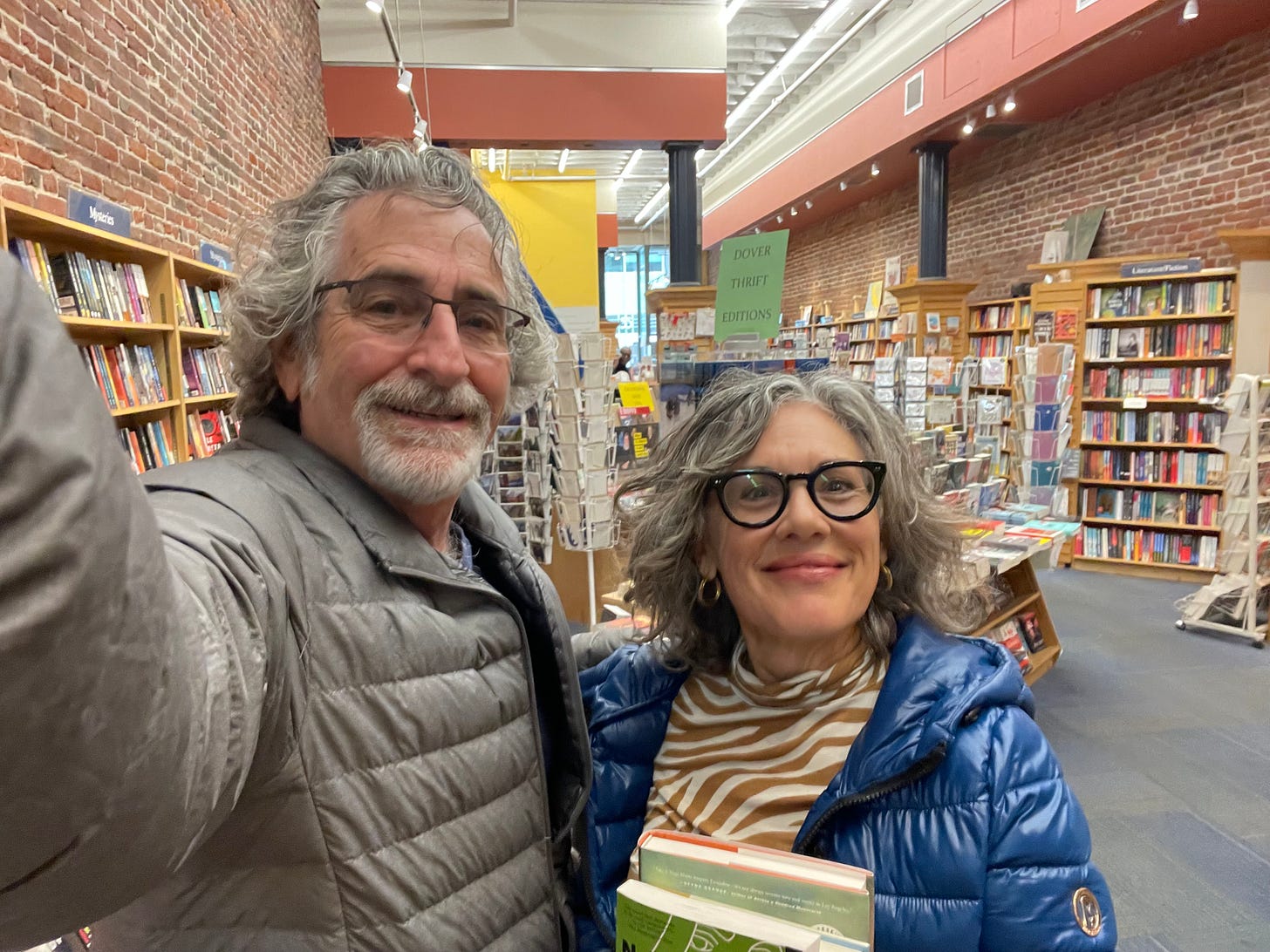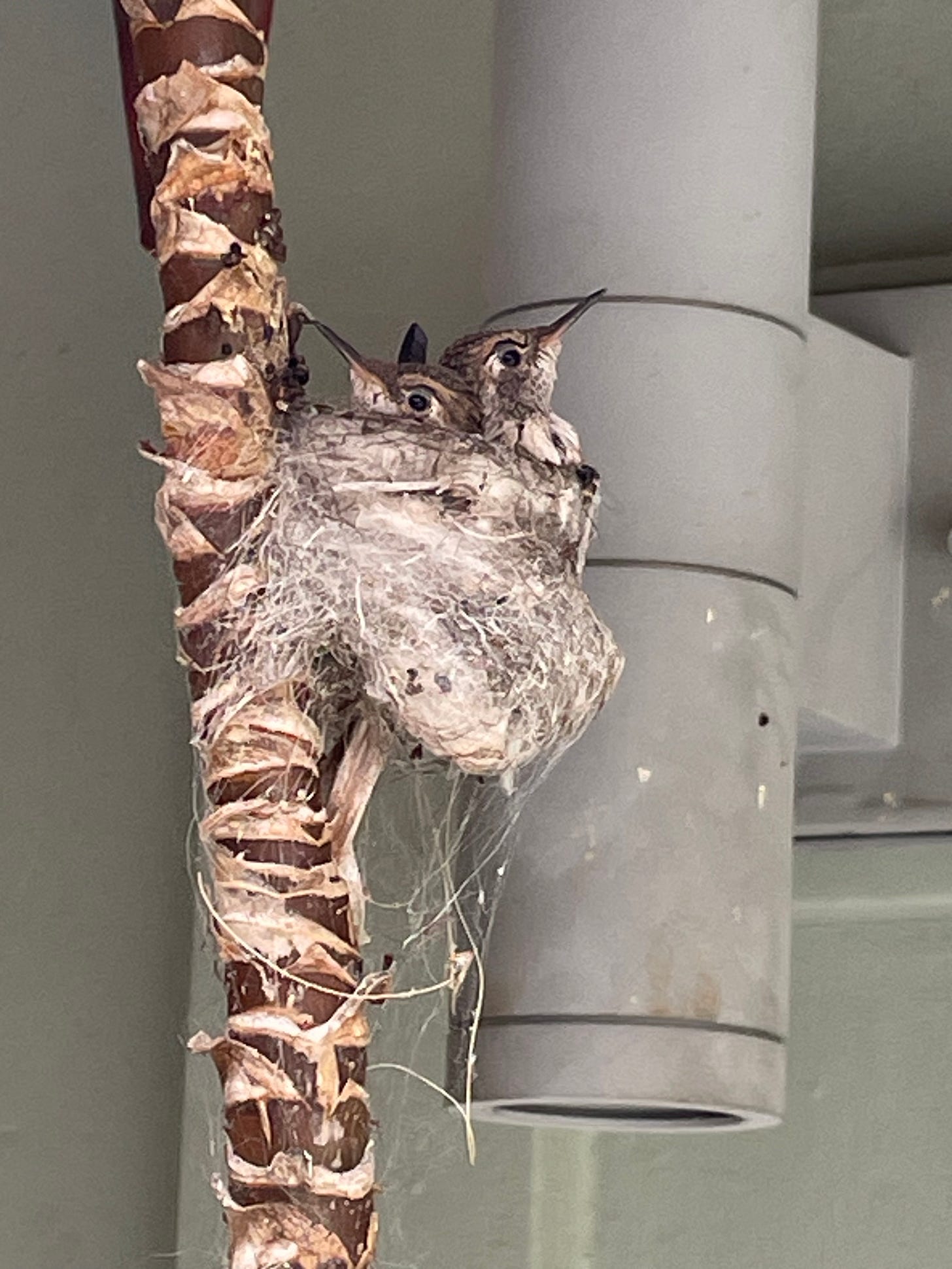An Interview with Novelist & Screenwriter Staci Greason
"Tragedy often drives people to do strange things. Strange behaviors can be funny."
Still some spaces left in the online nonfiction & fiction workshop (w/comedy-leaning assigned readings) I’m teaching starting Oct. 3, for UCLA Extension (10 weeks, no class Thanksgiving week) - more info and registration at this link.
Subscriptions to Bookish 📗 are 15% off through 9/24.
My first encounter with Staci Greason’s writing was in the fall of 2020 after we met at an online feature-script retreat organized by CineStory, a screenwriting-focused arts organization. I read her screenplay Treed and was particularly impressed by her assured comic touch and her ability to write about complex themes—environmental conservation and marital anomie, in this case—without being heavyhanded. She had also written Treed as a novel—albeit with a different title, The Last Great American Housewife.
Soon after we met at the retreat, Greason, who has also acted (along with roles in feature films, she played Isabella Toscano on Days of Our Lives), sold a different novel, All the Girls in Town, to indie publisher Touchpoint Press, and right away I hoped to get my hands on it. Admittedly, it’s a cliché to say that a book is a page-turner, but it’s nonetheless an apt description for this darkly comic, avenging-angel story about three women—Dani, Red, and Sasha—who have all suffered the misfortune of falling hard for Peter, a rock star who remorselessly uses and abuses them, creatively and sexually.
Dani, Peter’s ex-wife, writes a cathartic blog in which she imagines over and over different scenarios where she kills him or he otherwise meets with a brutal end. The blog serves as a unifying principle, and the three women concoct a bold plan to give Peter his comeuppance. The novel’s climactic moments are a study in jaw-dropping mayhem and righteous rage.*
Christine: All the Girls in Town addresses a number of serious subjects, among them, addiction, motherless children, infidelity, the challenges of caring for an ailing, contentious parent, sexual assault-–weighty themes. But there’s so much humor in this book, too. Has your tone always skewed more toward comedy than drama?
Staci Greason: When Dani’s sister, Monica, goes off the wagon again, and Dani inherits care of her niece Violet, and her senile, racist dad, Jack, she can either drive the arguing duo off a curve on Mulholland or turn up the radio and sing with Lee Presson & The Nails’ “La Brea Tar Pits. Where nobody’s dreams come true.” Tragedy often drives people to do strange things. Strange behaviors can be funny.
Why do we feel the urge to laugh at a funeral? It makes the grief we’re holding more bearable.
When my best friend died in a motorcycle accident at the age of twenty-three, an organist played Christian hymns in the funeral home. The blue casket up front was open. I could see the top of Richard’s dark handsome head. It was awful. He was so young. There were all of these old people mourning, dressed in dark suits. His bereft tiny parents sat up front. Everyone sang, Then sings my soul, my Savior God to thee, How great thou art…
Richard was a sweet guy, but he was no Christian. He was a Meat-Loaf-Bat-Outta-Hell, motorcycle-riding, horror-film writer, strip-club partaker, solid dude. One of his burly motorcycle buddies sat next to me. I felt his shoulders shaking and glanced over: the guy was ready to bust a gut. I shrugged and nodded. So, we slipped out a side door into the parking lot and laughed until we couldn’t stop crying. Isn’t that the way with sorrow? You just gotta find the absurd humor in the macabre and hold on because life is really hard.
CS: All the Girls in Town alternates between three third-person narrators, each a woman who has been romantically involved with Peter, who has achieved commercial music success by stealing lyrics from his ex-wife and relying on other more talented musicians to carry him onstage and in the recording studio. Did you ever consider including his point of view in the novel? Or was it always only the women, Red, Dani, and Sasha?
SG: When I finished the first draft of All the Girls in Town, I sent it to a literary agent who’d eagerly been waiting for a year to read it. She didn’t like the book. She hated Peter and thought he was one-dimensional. She also felt that these three great women would never date a jerk. Of course, my first reaction was indignation. After I bawled my eyes out, I wondered why hadn’t it occurred to me to consider Peter’s point-of-view?
So, I decided to let Peter tell his side of the story. After a few reluctant pages listening to Peter’s voice, I realized why he wasn’t in this book. This isn’t his goddamn story.
Twelve-step programs have a saying, “How empty of me to be so full of you.” This circles back to the agent’s second problem with the novel: her belief that great women don’t date jerks. I’m friends with a number of great women, so I beg to differ. I consider myself a fairly intelligent woman, and I’ve been slayed by some men who were real doozies. I also have fabulous women friends who’ve made foolish choices in love. A good-hearted woman in love with a good-timin’ man—it’s the catalog of songs about heartbreak.
When we meet Dani, Red, and Sasha, they are each still in the stage of reacting to Peter. Dani is stuck in blame. Red is trapped by rage. Sasha is lost and confused by Peter’s abrupt change in behavior. They may think they’re controlling the narrative or direction of their own lives, but they aren’t. The story is about him.
I wanted each woman to explore the why. Why after everything had each fought to keep Peter? Shame, embarrassment, low self-esteem, need for validation, loneliness, addiction, bad childhoods—all of these unhealed reasons that women can’t see when someone isn’t good for them and then why they stay.
Dani, Red, and Sasha’s interior lives represent the many women’s voices that I’ve heard, including my own. So much internalized shit that we don’t even challenge, that we take as our reality: what we’re supposed to look like, who we’re supposed to love, how many things we’re supposed to have accomplished at a certain age. Screw that.

CS: You write feature and TV scripts as well as fiction. What do you find to be the biggest challenges of these two forms, and do you prefer one over the other? I’m guessing your work on Days of Our Lives helped you when you started writing scripts.
SG: When I’m working on a novel, I prefer feature writing. When I’m feature writing, I yearn to be working on a novel. They each present a unique challenge. A novel is a giant, unwieldy beast full of mystery that slowly reveals itself over time. It requires much wrangling with diligence and patience. If I leave a novel-in-progress alone for too long, the characters often take weeks to reappear. I have to show up for several years to get a solid first draft of a book. The rewriting, after solid professional notes, is easier.
A script is rigid. It must adhere to a specific structure. When I was first writing screenplays and TV scripts, I followed the form, of course, but my approach was the same as writing fiction. I meandered, wandering up and down paths, without any solid sense of where I was headed. It wasn’t until I attended a workshop at the Austin Film Festival with screenwriter guru Meg LeFauve that I realized I had been avoiding structure. It made me nervous. What if I was terrible at it?
Of course, this meant I had to go into “the lava,” as Meg counsels. I confronted my fear and created a plot outline for the script I’d been working on, an adaptation of my last novel. I worked forward from that outline, rarely changing it, unless I realized a scene didn’t work, or I needed another scene. Discovering freedom within feature confines made me a better writer overall, I think.
Actors often migrate toward writing, or move back and forth between disciplines. Acting is a craft. I was taught to break down a play or script like an anthropologist. To understand the writer’s intentions and also make the story my own. It’s the actor’s job to create a fully-realized character with a backstory before they ever step onto the stage or set.
To read between the lines, to decide the subtext. What does the character actually want? How do they go about trying to get it? How do they behave when they don’t get it? Or when they do? What does it feel like to be in the character’s body? How do they move throughout space in relationship to others? Viewing the world through the character’s five senses became my approach to writing. In regards to writing TV scripts, it was definitely easier because it was familiar territory in both look and in feel. There is a certain energy or feeling that happens in my body when it’s time to enter a scene, finish it, or move on to the next act.
*This interview was excerpted from a longer one published last year in ZYZZYVA.
**Staci and Larry’s backyard is home to a hummingbird nest where two baby hummingbirds hatched and fledged earlier this year.
Also of note: Staci wrote an excellent essay “Feral,” about marrying for the first time in her 50s. It was published earlier this year in
here on Substack.



Fascinating! Thanks Christine. I